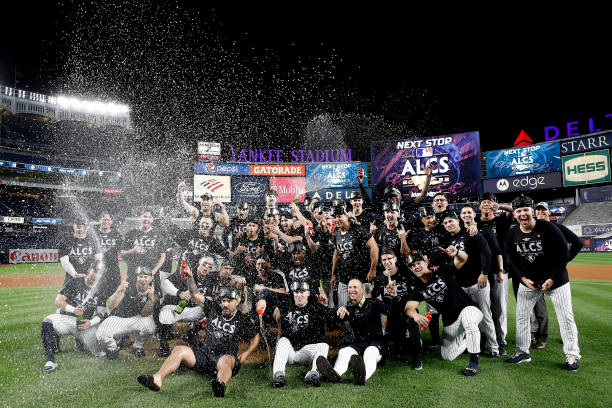The Bronx Bombers are moving on. In a hard-fought five-game ALDS, the New York Yankees managed to outlast the Cleveland Guardians thanks to outstanding starting pitching, timely homers, and clutch (enough) relief pitching. Despite a .182 team batting average, New York’s 9–3 advantage in home runs was a key difference maker. The Guardians proved to be a tougher out than many expected. Their style of play differs in many ways from the Yankees, and it nearly carried them to victory. In the end, though, those few key factors mentioned before gave the Yankees an edge. Here’s a closer look.
How the Yankees Outlasted the Guardians
Starting Pitching
The starting rotation came up big in all five games for the Yankees. Gerrit Cole (who would likely be named series MVP if they awarded it for this round) was stellar in Games One and Four. To open the series, Cole pitched 6 1/3 innings, fanning eight Cleveland hitters, and giving up one run on a solo shot by Steven Kwan. In a must-win Game Four, he went even further, going seven frames. As he did in Game One, he recorded eight strikeouts, and only gave up a solo homer to Josh Naylor. That one was a bit more YouTube-worthy than Kwan’s.
Nestor Cortes also delivered a pair of very good starts in the series, giving the Yankees a chance in both games. In Game Two, he battled through five innings, giving up two runs on six hits. Despite walking three, he limited the damage and left the game tied 2–2. Extra innings did not go New York’s way that day, but Nestor’s fortunes would shift in the deciding game. He again went only five innings due to short rest, but this time only gave up one run on a sac fly. Bolstered by an early Yankees lead, he turned it over to the bullpen, which shut out Cleveland the rest of the way.
The Yankees lost Game Three in heartbreaking fashion, but Luis Severino’s performance was a positive takeaway. He battled through 5 2/3 innings, giving up three runs, striking out six and departing with the lead. While Cleveland’s starters did an admirable job stifling the Yankees’ bats, New York’s rotation edged them out. In all five games, the Yankees starter left with the team either tied or ahead. In a series with relatively limited offense, that combined performance was essential to the Yankees outlasting the Guardians.
Clutch Homers from Bader and Others
A Yankee newcomer, Harrison Bader made his presence known once the calendar shifted to October. He put the Yankees on the board in Game One, answering Kwan’s solo shot in the top of the third with one of his own. In Game Three, he tacked on in the seventh with another solo homer, giving the Yankees a temporary 5–3 lead that got away. In a must-win Game Four, Bader hit a two-run blast in the top of the second, providing enormous insurance runs en route to a 4–2 victory, and keeping their season alive. Bader saw little regular season action with the Yankees after his arrival at the trade deadline due to injury. But that helped him make history, becoming the first Yankee to hit his first three homers with the team in the postseason.
The dynamic duo of Aaron Judge and Giancarlo Stanton set the tone in Game Five. In the first inning, Stanton greeted Cleveland starter Aaron Civale with a three-run blast to right-center. Civale was pulled soon after. This likely pleased Judge, who struck out in his only at-bat against the righty. Coming up against southpaw Sam Hentges in the second, Judge hit a solo shot to nearly the same spot as Stanton’s homer. This padded a Yankees lead they would not relinquish. The Bombers are now 28–2 all-time (including postseason) in games where Judge and Stanton both homer. Ultimately, New York’s superior power helped them win a series where they otherwise struggled offensively. Against a team like Cleveland, who relied almost exclusively on small ball in these games, it was just enough.
Bullpen Bent but Didn’t Break
With no set closer, the Yankees’ bullpen entered the series in an “all hands on deck” mindset. As expected, the results were mixed. The bullpen locked down a Game One victory after Cole’s departure, pitching 2 2/3 shutout innings. In Game Two, the Yankees tapped usual starter Jameson Taillon to come on in the 10th, perhaps anticipating the game to go deep into extras. However, some well-placed Cleveland hits gave them a two-run lead, which they maintained.
Game Three was an even worse story for the pen. After Lou Trivino and Jonathan Loaisiga each departed earlier than they could have, manager Aaron Boone kept Wandy Peralta in for the ninth, not wanting to go to Clay Holmes on consecutive days. Peralta put two men on base, leading to his departure. With Holmes unavailable the game fell on Clarke Schmidt’s shoulders. Schmidt, who had never pitched in such a high-leverage spot, came one strike away from securing the win, but gave up a walk-off two-run single to Oscar Gonzalez.
With the Yankees on the brink of elimination, their relievers came through. After the Game 3 walk-off, the bullpen didn’t allow another run all series. They pitched two shutout innings to preserve Cole’s Game Four win and, perhaps benefiting from the extra rest due to Monday’s rainout, delivered four shutout innings to clinch the series win. The Yankees have no off days before facing the Houston Astros in the ALCS, meaning the bullpen will be taxed once again. It’s safe to expect mixed results for this series as well. If they bend, but don’t break, the Yankees may well outlast the Astros like they did the Guardians.
Main Photo:
Embed from Getty Images
Players/Managers Mentioned:
Gerrit Cole, Steven Kwan, Josh Naylor, Nestor Cortes, Luis Severino, Harrison Bader, Aaron Judge, Giancarlo Stanton, Aaron Civale, Sam Hentges, Jameson Taillon, Lou Trivino, Jonathan Loaisiga, Aaron Boone, Wandy Peralta, Clay Holmes, Clarke Schmidt, Oscar Gonzalez






